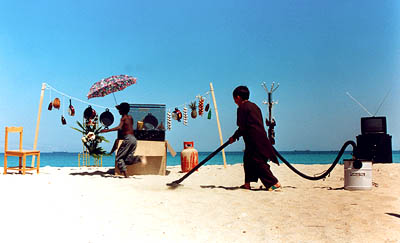The Day I Became a Woman
(Roozi khe zan shodam)


Iranian movies frequently defy all Hollywood conventions. For the uninitiated, they seem long, dull, and boring. But in their own way, Iranian filmmakers are pushing the boundaries of film their own way, using movies less to tell stories and more to convey messages. The Day I Became a Woman tells three stories of women at different ages. Each story is a metaphor for the struggles that women, particularly Muslim women, endure. Who should know better about the struggles of Muslim women than first-time director Marzieh Meshkini, the wife of legendary Iranian director (and the writer for this film) Mohsen Makhmalbaf (Blackboards, Kish Tales).
The first story is about Hava (Fatemah Cherag Akhar), a nine-year old girl. Today is her birthday, and her first day as a woman. That means she can no longer play with boys, and must cover herself. Nevertheless, she wants to play with a friend, and when she finds out she was born at noon, her mother relents and allows her to play until then. It's not clear that she fully understands the significance of her final playtime. In a way, she is losing a sense of innocence in her life. The next story is about Ahoo (Shabnam Toloui). She is cycling in a race along the coast. Her husband rides up on a horse and demands that she stop. She refuses, and he threatens to divorce her. He keeps returning with more people including their matchmaker and the village elders, but she ignores them and keeps cycling. Here, the race becomes a race for Ahoo's freedom. She is running away from her husband and a life she hates to an unknown point in the future.
Meshkini also fills The Day I Became a Woman with surreal imagery. There is something both bizarre and compelling about watching many black-robed women cycle. The final story of Hoora (Azizeh Sedighi) has an old woman in a wheelchair pushed by a young man, followed by a strange procession of boys carting appliances. Hoora is in the twilight of her life, and she is going on a shopping spree. She is buying a refrigerator, bed, sofa, wedding dress, and everything else she could never afford when she was younger. She never fully reveals how she got the money, or what she is going to do with her goods. It's not even clear if she is completely in her right mind.
The way that these stories play out is almost dreamlike. There are long periods of silence punctuated by loud ambient noise (lapping waves or hooves) and the loud voices of the people. Each story takes place at a different point in the lives of the women (beginning, middle and end) and can represent freedom, subjugation, or both. Like many other movies from Iran, none of the principal stars are actors. Their performances have a stark sense of reality to them. Also, like in some movies from Iran, there is a lack of subtitling. Sometimes, people will talk for a while, with little or no translation. But this is a small complaint for an otherwise moving, emotional film.